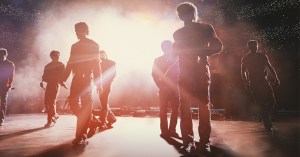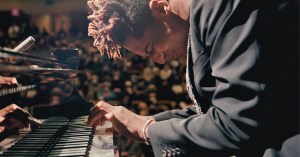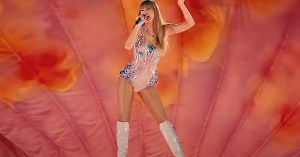15 Movie Scores To Keep You Sane Through Quarantine
These rousing, moving, and soothing scores pair perfectly with stuck-at-home activities like reading, cooking, chilling, and escaping your kids. (Oh, and working, too.)
We have been busy at Rotten Tomatoes these last two months recommending tons of movies and TV series to watch during quarantine (you can find a ton of lists here). But sometimes you’re not in a position, or mood, to plonk yourself down in front of a screen. Perhaps you’re working, or gardening, or cooking, or exercising, or hiding in a closet for a few minutes of peace and quiet away from your kids/pupils/audience. Either way: tough to follow the twists and turns of Ozark as you do that. To help in these moments – and to generally keep you sane and healthy as we endure our collective cabin fever – the RT staff curated a list of 15 scores to pair with different parts of your quarantine life. Looking for something to push you through that last set of burpees? We have an orchestral doozy for you. Got a swoony Zoom date? Try something with French flavors. Want a new soundtrack to your Animal Crossing hours? Daft Punk is here to help.
What movie music are you listening to at home? Let us know in the comments.

(Photo by © Columbia/courtesy Everett Collection)
Composer: Michael Nyman
There are moments in Gattaca where nothing much is happening on-screen, but the rich Michael Nyman score is going in hard. In my early Gattaca-watching career (I’ve seen the movie eight or nine times now), I thought this was faulty, like the music was overcompensating. Plainly, this was a bad take. The music is devastatingly romantic. And not just how it informs the relationship between Jerome and Irene (Ethan Hawke, Uma Thurman), but also Jerome’s love for himself, to believe he is capable of something far beyond his cursed birthright. These times ask us to search for this kind of inner strength, to navigate daily life’s new chaos, and carry a torch of hope for the not-too-distant-future. Gattaca‘s soundtrack, culminating in the impossible beauty of “The Arrival,” is the music of that guiding light.
Listen when: Working from home – this s–t is motivating! – but only if you like your job, and you’re not on a call. – Alex Vo, Editor

(Photo by Courtesy Everett Collection)
Composer: Nino Rota
Italian composer Nino Rota has quite the résumé: La Dolce Vita, 8 1/2, and, of course, the first two Godfather films, both of which earned him Oscar nominations, and the second of which got him a win. My personal favorite, though, is his score for Franco Zeffirelli’s 1968 version of Romeo and Juliet, starring Leonard Whiting and Olivia Hussey. Maybe it takes me back to the high school English class in which I first saw the film, but there’s something about Rota’s love theme – a little trepidatious at first before a rousing strings-led swell, all laced with a certain feeling it’s not going to turn out well – that helps me focus when editing or reading. Be warned though: The score’s final tracks, which accompany the tragic finale on screen, are intense. Skip those, re-start from the beginning, and pretend the young lovers had a dagger-less ending.
Listen when: You’ve carved out some time in your day to read (and have got your “looking interested” photo programmed to your Zoom feed). – Joel Meares, Editor-in-Chief

(Photo by Courtesy the Everett Collection)
Composers: Duke Ellington, Billy Strayhorn
There are several reasons why Otto Preminger’s Anatomy of a Murder is one of the greatest courtroom dramas ever, but it’s arguably best remembered for its striking opening title sequence by Saul Bass and its incredible soundtrack, composed by none other than jazz legend Duke Ellington and his longtime collaborator Billy Strayhorn. Together, Ellington and Strayhorn put together a complete musical package that was alternately sultry (“Flirtibird”), playful (“Happy Anatomy”), melancholic (“Almost Cried”), and mysterious (“Midnight Indigo”), and it all still feels fresh and alive today. Of course, the most memorable song is probably the “Main Title” theme that accompanies Bass’ opening credits, but the whole score just drips with style. It’s also worth noting that it was not only one of the first soundtracks entirely scored by jazz musicians, but also the first one for a major Hollywood film that was created by an African-American composer. Movie soundtrack or not, it’s a masterpiece.
Listen when: You’re feeling fancy and having a glass of wine in a bubble bath. – Ryan Fujitani, Snr. Editor

(Photo by © Amazon Studios /Courtesy Everett Collection)
Composer: Jo Yeong-wook
The Handmaiden, like so many others, is the type of film that Bong Joon-ho spoke of when he urged English-speaking audiences to hurdle over the “one-inch barrier of subtitles” during one of his acceptance speeches last year for Parasite. The Korean- and Japanese-language film, which was not selected for Best International Film in 2016, sadly never reached a wide audience and was instead relegated to join other underrated/unknown non-English gems (most of which are available to stream – so get busy). Due to its under-the-radar status, many not only missed the seductive romance-thriller director Park Chan-wook weaved, but also the humorous and erotic score that plays throughout most of the film. The music, like the film it plays beneath, is surprising and genre-defying, mixing dark themes employing strings, clarinets, and harps with romantic melodies.
Listen when: You’re scrolling through exotic locales, dreaming of the day you can travel to distant lands once again. – Jacqueline Coley, Editor

(Photo by Richard Foreman Jr/©FilmDistric/Courtesy Everett Collection)
Composer: Cliff Martinez
You can split Drive‘s original Cliff Martinez soundtrack into three categories: Pensive, ethereal, and fittingly, driving. “Kick Your Teeth” and “Skull Crushing” are among the pensive songs, and they suggest a shadow looming high over your shoulders, like a clockwork beast wound up to strike. The ethereal songs make you feel like you’re drifting through a hazy dream, and have incongruous names like “They Broke His Pelvis” and “Wrong Floor.” These two moods converge in the driving songs (“Rubber Head,” “Where’s the Deluxe Version?,” “Hammer”) that speak to those luxuriating in their delusional power fantasies and modern fairy tales. And, in this world, who can blame them?
Listen when: You’re out for a sanctioned late-night drive, on the route with the most lights. – Vo
and

(Photo by © Walt Disney Studios Motion Pictures, © Pixar)
Composer: Randy Newman
Over four films, the themes and movements of Randy Newman’s Toy Story scores have become as familiar to many ’90s kids as “The Imperial March” – though the effect of Newman’s sometimes jazzy, sometimes rousing music is far less hair-raising. In fact, the music of Toy Story is total comfort food during these trying times, particularly the first Toy Story’s opening flourish, “Andy’s Birthday,” which will shoot you straight back to a buttery-smelling movie theater circa 1995, to the first time you saw this computer-animated marvel. (“Sid” on the other hand may give you those Darth Vader vibes; skip it.) The sung songs on these soundtracks are a treat – “You’ve Got a Friend In Me” will keep you smiling, while you can turn to Toy Story 2’s “When She Loved Me,” performed by Sarah McLachlan, if you just feel like having a good cry. You know, the kind you have when you’re watching a Pixar movie.
Listen when: It’s 3pm, you have a few hours of work left, and you need a solo pick-me-up. – Meares

(Photo by ©Walt Disney Pictures/Courtesy Everett Collection)
Composers: Daft Punk
Director Joseph Kosinski already had a daunting task before him when he agreed to helm a sequel to a beloved cult classic, but he made things just a bit easier on himself by recruiting possibly the most fitting composers for the film: Daft Punk. The legendary French electronic duo – who, unsurprisingly, admitted the original Tron was a big influence on them – relied on a mix of traditional orchestral compositions and some that blended strings and horns with synthesized elements and their trademark arpeggios to create a propulsive, otherworldly sound. Their work goes a long way toward establishing the mood and tone of the film, and considering they started working on the score even before the film entered production, it’s incredible how well it fits the dark cyberpunk aesthetic. Daft Punk being who they are, the Tron Legacy soundtrack got a lot of attention, and while audiences may argue about the quality of the film itself, the music remains one of its undisputed high points.
Listen when: You need some epic music while you fish in Animal Crossing. – Fujitani

(Photo by Courtesy the Everett Collection)
Composer: Yann Teirsen
The accordion-heavy music that playfully scored Jean-Pierre Jeunet’s Oscar-nominated film Amélie has, in the almost 20 years since the movie’s release, become synonymous with Paris and particularly Montmartre, the cobblestoned neighborhood where most of the story takes place. French musician Yann Tiersen earned wide international acclaim for his work – and a César Award, and a BAFTA nomination – but would go on to later say that the fame Amelie gave him was something he resented; he would be forever linked to the quirky French hit. His score, despite his feelings, is iconic for a reason, providing a sonic fantasy land that, back in 2001, allowed a pixie-like waitress to find her happy ending, but today can take the listener anywhere they want to go. Perhaps you will take a moment in these times to fantasize about slow walks on the Seine with your one true love.
Listen when: Noshing on something French – crepes and Nutella are easy enough – on a Zoom date with your boo. – Coley

(Photo by Tartan Films/courtesy Everett Collection)
Composers: Choi Seung-hyun, Lee Ji-soo, Shim Hyeon-jeong
South Korean director Park Chan-wook’s twisty and twisted revenge thriller is rightly revered as a genre standout that helped put the country’s contemporary cinema on the world map. Its pulpy narrative, stylish direction, and one-take hallway fight sequence get all the attention, but the film wouldn’t have had the same impact if it weren’t for the score, composed by Choi Seung-hyun, Lee Ji-soo, and Shim Hyeon-jeong. While the more propulsive, electronic pieces may sound a little dated, the moody orchestral numbers feel like they’ve been ripped from some elegant, forgotten film noir; listen to “Kiss Me Deadly,” “It’s Alive!”, “The Big Sleep,” or any of the score’s melancholy waltzes for starters. Oh, and in case those titles didn’t clue you in, most of the original compositions are named after other movies, many of them film noirs themselves, which is a nice extra detail for movie buffs.
Listen when: You need to blow off some steam after a long day working from home – or you’re trying to solve the mystery of those undelivered Amazon packages you ordered. – Fujitani

(Photo by Casi Moss, courtesy of A24)
Composer: Alex Weston
The score for Lulu Wang’s incredibly moving The Farewell is an aspect of the movie that I think gets too often overlooked; recall some of the film’s most memorable moments – the family slo-mo walk, the driving away in the cab at the end – and you’ll see how important the musical choices were for making them stand out. Alex Weston’s compositions feel unapologetically classical, even operatic – the wordless vocals throughout come courtesy of tenor Mykal Kilgore – and yet they also feel inherently Eastern, an apt sonic effect given the themes of the film. A departure from most of the music, and a standout track, is soul singer Elayna Boynton’s cover of Leonard Cohen’s “Come Healing.”
Listen when: The crushing anxiety of all that is happening starts seriously stressing you out. Or when rearranging the bookshelf. – Meares

(Photo by ©Superlative Films/courtesy Everett Collection)
Composer: Hammock
Hammock is a Nashville post-rock band that composes long, unhurried ambient songs without vocals or drums. Columbus is a quiet movie about two lost strangers (John Cho, Haley Lu Richardson) who meet in the Ohio town and bond over its surprising modernist architecture. By any measure, the band and movie are far from mainstream in their respective mediums, but the two coming together for the original soundtrack is a thing of niche beauty. Across Columbus director Kogonada’s pristine, meticulous shots and the building intimacy between the characters, Hammock’s music is used very sparingly, so listening to the 16-song soundtrack is a true act of discovery for Hammock fans. The songs, per usual, are compact galaxies of swelling sound. They suggest stillness, composure, and reflection – the kinds of moods one might feel when studying architecture. Or observing the world around you. As long as you’re looking up.
Listen when: Dusk starts to settle in in and your work for the day is all done, or you’re doing a spot of gardening. – Vo

(Photo by Wilson Webb/©Weinstein Company/Courtesy Everett Collection)
Composer: Carter Burwell
The Oscar-nominated score for Todd Haynes’ haunting love story, Carol, is considered by many to be one of the best film compositions from the 21st century. The ’40s-inspired score also provides the perfect soundtrack for quiet meditation in the age of COVID-19. For Carol, Carter Burwell composed delicate and teasing melodies with woodwinds, strings, and xylophones that will instantly help you get Zen-y. Like the fated lovers at the center of the drama (masterfully brought to life by Rooney Mara and Cate Blanchett), Burwell’s chord progressions delay their resolution but find their home triumphantly in the end.
Listen when: You need a moment of relief from your “Baby Shark”-induced headache (and the kids that instigated it). – Coley

(Photo by Annapurna Pictures)
Composer: Nicholas Britell
Two-time Oscar nominee Nicholas Britell’s most recognizable music might be his theme for HBO’s Succession, and while we certainly pay our respects to that antsy ditty – and the memes it inspired – it’s a little anxiety-inducing for our current moment. For something more soothing and just knock-your-socks-off gorgeous, Britell’s score for Barry Jenkins’ If Beale Street Could Talk is a wonderful blend of euphoria and melancholy that feels perfectly of its place and setting (Harlem, 1970s). It’s a lush strings-heavy score that follows the beats of the doomed love story the movie tells; listen to bonus track “Harlem Aria” to see what the score might have sounded like had Britell stuck with horns as the dominant instrument.
Listen when: You’re out on a socially distanced walk and really soaking in your surrounds. – Meares

(Photo by 20th Century Fox Film Corp.)
Composers: Trevor Jones, Randy Edelman, Dougie MacLean
The story behind the score of Michael Mann’s epic rendition of James Fenimore Cooper’s 1826 novel is fraught with strife, which makes it all the more impressive that it turned out as incredible as it did. Mann initially asked composer Trevor Jones for an electronic score, but switched things up quite far into the production when they realized orchestral music would be more appropriate. Jones had to scramble not only to deliver an entirely new score, but also to keep up with the film’s last-minute editing, and Randy Edelman was brought on board to help finish it on time. The end result, of course, is a dramatic, sweeping array of compositions that evoke the film’s most emotional scenes. The film’s main theme, “Promontory,” a reworking of Scottish singer-songwriter Dougie MacLean’s “The Gael,” is instantly recognizable, but the star of it all is arguably the main title score. It’s an ominous procession of drums, strings, and horns that erupts into an iconic refrain that’s somehow heartbreaking and triumphant at the same time, and if it doesn’t inspire you to fight for something – anything – then you might need to get your pulse checked.
Listen when: You need extra motivation during your stay-at-home workout. –Fujitani








